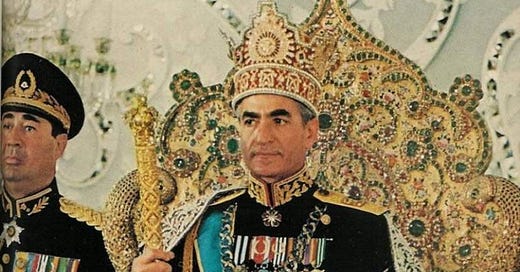Overthrowing the Iranian Regime? Again?
The historical illiteracy of those advocating regime change in Iran is even deeper than you think.
The Trump administration is contemplating joining Israel’s war against Iran by participating in direct strikes, including using 30,000-pound “bunker buster” bombs against Iran’s underground nuclear facility, Fordo. The goal of this could be to stop the Iranians from developing nuclear weapons. But some members of the administration, and some prominent Republicans, are advocating for the much broader objective of overthrowing the Islamist Iranian government.
Critics of a regime change war in Iran, including leading figures in the Trump-aligned MAGA movement, are pointing to the history of failed US regime change wars in the region as a cautionary tale. These critics are highlighting the 2003 US invasion of Iraq as the relevant example. As they rightly point out, Iraq war planners knew next to nothing about Iraqi society and politics, and they greatly overestimated what military action could accomplish. As a result, they profoundly misjudged the consequences of toppling the Baathist government. The war ended up a disaster for Iraq and for US strategic interests.
These critics are claiming that attempting a regime change war in Iran now would repeat the US’s mistakes in Iraq. They are accusing advocates of war of failing to learn the lessons of history.
But the lessons of history go even deeper. This would not be the first time the US has conducted a regime change in Iran. In one of the great moral stains in the history of US foreign policy and a watershed in US-Iran relations, the United States toppled the democratically elected government of Iran in 1953. That government, led by prime minister Mohammad Mosaddegh, was threatening to nationalize the Iranian oil industry which at the time was controlled by western oil companies. The US and Britain found this possibility intolerable and decided to overthrow the Iranian government.
This operation not only violated the sovereignty of the Iranian people by removing the government it elected. It also destroyed the robust democratic order that Iranians had developed over decades of struggle. The US replaced democracy in Iran with an autocratic system led by Shah Mohammad Reza Pahlavi. This government, with direct support from the US, ruled Iran with an iron fist for nearly three decades. One of its main instruments of repression was a secret police force trained in the United States.
As you might expect, this was a searing experience for Iranians. It deeply ingrained the perception of the US as an enemy of Iran. And it set the stage for the Iranian revolution of 1979, which ended up establishing the current Islamic theocracy.
So, there is a connection between past US intervention in Iran and the current one under consideration. Though it is important not to overstate the role of the US in Iranian history (and thereby ignore the agency of the Iranian people), the immoral and strategically short-sighted 1953 regime change does much to explain the existence of the current Iranian regime and its hostility to the US.
Seen this way, the US is currently contemplating the overthrow of an Iranian government that is hostile to the US in part because of a previous US war to overthrow an Iranian government. The historical irony here is rich. But, what’s worse, the irony appears to be entirely lost on Americans. A second regime change war in Iran is being discussed in the US today in complete ignorance of the history of US intervention in Iran.
Critics of a possible second intervention in Iran are right to say that it would be a failure to learn the lessons of history. But I think even these critics are missing the depth of those lessons. I think they should lead us beyond mere skepticism toward war against Iran and toward a deep rethinking of the very basis of our antagonism.
For further reading on these events, I recommend Stephen Kinzer’s, All the Shah’s Men; Fakhreddin Azimi’s, The Quest for Democracy in Iran; and Robin Wright’s, The Last Great Revolution.




Regime change also overlooks the progress Iran has made after years of youth led protests. I worry there will be a chilling effect on Iranian progressives looking to liberalise their country… which would be the stated goal of a regime change.
“Those who do not study history are doomed to repeat it. But those who do study history are doomed to watch others repeat it”
I’m currently in disbelief that anyone close to the levers of power could take the idea of the US trying another regime change operation as anything other than an absurdity. This is especially true if Trump and his inner circle, given the MAGA movements visceral opposition to such insanity in our foreign policy. Historical illiteracy seems almost too gracious of a description for anyone who thinks this is a good idea.
I want to believe Trump has a plan that doesn’t involve us getting involved in this mess, but I have a growing unease that my desired belief is just blind hope and I’m going to be sorely disappointed.
I don’t see how us getting involved in this mess is anything other than a catastrophe of the highest order. When will the warmongers be relegated to the wilderness where their voices belong.
If Trump does take the bait, it will be the end of the MAGA movement. The disillusionment among the MAGA faithful over such a betrayal will destroy the developing coalition. And I fear for what would emerge in that vacuum.